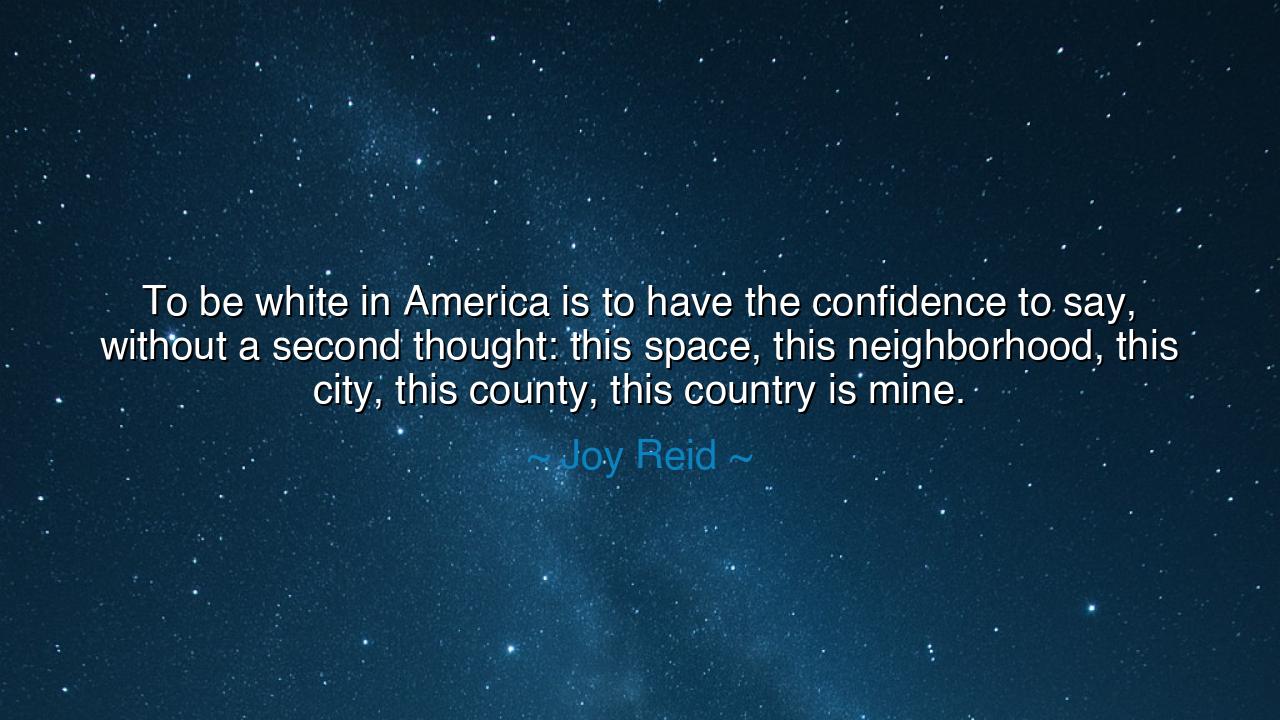
To be white in America is to have the confidence to say, without
To be white in America is to have the confidence to say, without a second thought: this space, this neighborhood, this city, this county, this country is mine.






Come, O children of wisdom, and listen closely to the words of Joy Reid, for they carry a truth that stirs the very soul of justice and equality. She said, "To be white in America is to have the confidence to say, without a second thought: this space, this neighborhood, this city, this county, this country is mine." In these words, she speaks of a truth that many would rather ignore—the undeniable privilege and entitlement that comes with being white in a society where power, wealth, and opportunity are too often concentrated in the hands of a single racial group. Reid names this power, this unearned confidence, which comes not from merit, but from the historical, deeply entrenched systems that have been built to ensure that those with white skin are granted ownership over the physical and social spaces they occupy.
Consider, O children, the ancient tribal kingdoms that flourished in the past, where kings and rulers claimed vast territories, declaring them as their own not because they had earned them, but because they were born into power. The land, the wealth, the resources—all belonged to the rulers by virtue of their birthright, not by the work they did or the struggle they faced. In the same way, white Americans have been granted dominion over spaces—be it neighborhoods, cities, or entire regions—not because they are any more worthy of these spaces, but because of the legacy of racial hierarchies established through centuries of colonization, slavery, and segregation. This privilege allows them to walk into a room, a building, or a community and claim it as their own, without hesitation, without question.
Let us turn our gaze to the days of colonialism, when the European empires carved up the world as if it were a treasure map, deciding which lands and peoples were worthy of dominion and which were not. The lands of Africa, Asia, and the Americas were taken by force, with little regard for the lives and cultures of those who had lived there for millennia. The British Empire, for example, built its vast dominion through the belief that white men were born to rule, that their authority was unquestionable, and that the lands they conquered were theirs by divine right. The confidence that Reid speaks of is born from the same belief—that to be white is to possess a divine right over land, people, and resources.
In America, this entitlement did not fade with time. From the days of slavery to the forced relocation of Native Americans, to the systematic redlining of black and brown communities, the history of white dominance is written in the very bones of the nation. The confidence to claim a space, to say "this is mine," is rooted in a long history of racial privilege, one that has been passed down through the generations, often hidden under the guise of meritocracy. Yet, it is a confidence that is built on exclusion, on the erasure of those who have been systematically denied the same rights, the same opportunities, and the same access to the spaces that whites occupy freely.
Consider the Civil Rights Movement in the 1960s, a time when black Americans, denied access to many of the same spaces as their white counterparts, stood up and demanded to be heard. Figures like Martin Luther King Jr., Rosa Parks, and Malcolm X led the charge against this racial divide, insisting that they, too, had a right to belong. Their very presence in spaces where they were not allowed to be was an act of defiance—a reclaiming of what had been taken from them. The confidence that Reid speaks of was not afforded to them. They had to fight for their right to live and thrive in the same spaces that others took for granted. The lesson they taught the world was that the spaces we occupy are not just physical—they are also a reflection of our human dignity, our right to exist as equals in the world.
And now, O children, what lesson do we draw from these powerful truths? Reid’s words are a call to awareness—to recognize the invisible yet powerful forces that shape our world. It is a call to confront the systemic inequality that allows certain groups to take ownership of spaces while others are denied that right. The lesson is that the world does not belong to a select few, to those who were born into power. It belongs to all who live and breathe in it. To truly create a world of justice, we must unlearn the entitlement that is ingrained in us and work together to redistribute power, to break down the barriers that divide us, and to give every individual the freedom to claim space without fear of being dispossessed.
So, rise, O children, and let this be your truth: the spaces we occupy belong to all of us, not to a privileged few. Let us work to reshape the world in a way that allows every person, regardless of their skin color or background, to stand confidently in any space they choose to inhabit. Let us confront the entitlement that seeks to keep others out and create a world where all can say, without hesitation, "This space is mine," knowing that it is rightfully theirs.






AAdministratorAdministrator
Welcome, honored guests. Please leave a comment, we will respond soon